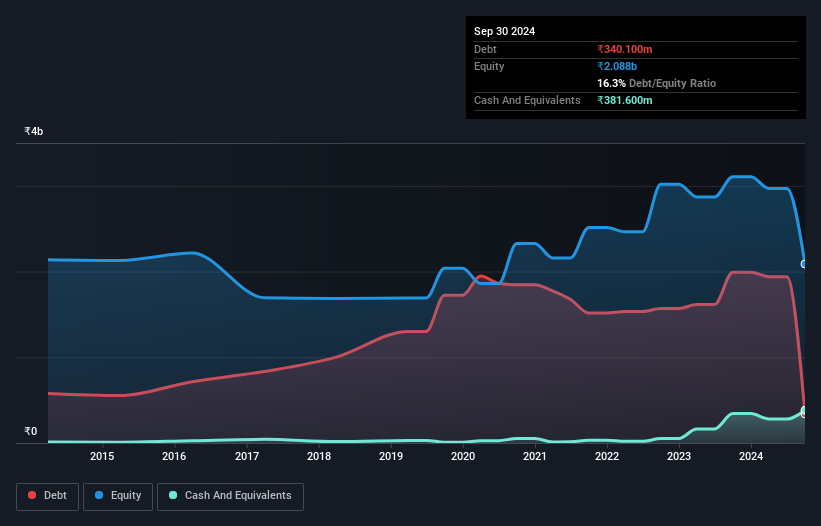
Some say volatility, rather than debt, is the best way to think about risk as an investor, but Warren Buffett famously said that 'Volatility is far from synonymous with risk.' So it might be obvious that you need to consider debt, when you think about how risky any given stock is, because too much debt can sink a company. Importantly, Rossell India Limited (NSE:ROSSELLIND) does carry debt. But is this debt a concern to shareholders?
What Risk Does Debt Bring?
Generally speaking, debt only becomes a real problem when a company can't easily pay it off, either by raising capital or with its own cash flow. In the worst case scenario, a company can go bankrupt if it cannot pay its creditors. However, a more common (but still painful) scenario is that it has to raise new equity capital at a low price, thus permanently diluting shareholders. Of course, the upside of debt is that it often represents cheap capital, especially when it replaces dilution in a company with the ability to reinvest at high rates of return. When we think about a company's use of debt, we first look at cash and debt together.
See our latest analysis for Rossell India
What Is Rossell India's Net Debt?
You can click the graphic below for the historical numbers, but it shows that Rossell India had ₹340.1m of debt in September 2024, down from ₹1.99b, one year before. But on the other hand it also has ₹381.6m in cash, leading to a ₹41.5m net cash position.

How Strong Is Rossell India's Balance Sheet?
According to the last reported balance sheet, Rossell India had liabilities of ₹569.5m due within 12 months, and liabilities of ₹21.2m due beyond 12 months. Offsetting these obligations, it had cash of ₹381.6m as well as receivables valued at ₹198.9m due within 12 months. So these liquid assets roughly match the total liabilities.
Having regard to Rossell India's size, it seems that its liquid assets are well balanced with its total liabilities. So it's very unlikely that the ₹2.68b company is short on cash, but still worth keeping an eye on the balance sheet. While it does have liabilities worth noting, Rossell India also has more cash than debt, so we're pretty confident it can manage its debt safely.
It is well worth noting that Rossell India's EBIT shot up like bamboo after rain, gaining 94% in the last twelve months. That'll make it easier to manage its debt. There's no doubt that we learn most about debt from the balance sheet. But it is Rossell India's earnings that will influence how the balance sheet holds up in the future. So when considering debt, it's definitely worth looking at the earnings trend. Click here for an interactive snapshot.
But our final consideration is also important, because a company cannot pay debt with paper profits; it needs cold hard cash. While Rossell India has net cash on its balance sheet, it's still worth taking a look at its ability to convert earnings before interest and tax (EBIT) to free cash flow, to help us understand how quickly it is building (or eroding) that cash balance. Considering the last three years, Rossell India actually recorded a cash outflow, overall. Debt is far more risky for companies with unreliable free cash flow, so shareholders should be hoping that the past expenditure will produce free cash flow in the future.
Summing Up
We could understand if investors are concerned about Rossell India's liabilities, but we can be reassured by the fact it has has net cash of ₹41.5m. And we liked the look of last year's 94% year-on-year EBIT growth. So we are not troubled with Rossell India's debt use. The balance sheet is clearly the area to focus on when you are analysing debt. However, not all investment risk resides within the balance sheet - far from it. To that end, you should learn about the 3 warning signs we've spotted with Rossell India (including 1 which is significant) .
If, after all that, you're more interested in a fast growing company with a rock-solid balance sheet, then check out our list of net cash growth stocks without delay.
New: AI Stock Screener & Alerts
Our new AI Stock Screener scans the market every day to uncover opportunities.
• Dividend Powerhouses (3%+ Yield)
• Undervalued Small Caps with Insider Buying
• High growth Tech and AI Companies
Or build your own from over 50 metrics.
Have feedback on this article? Concerned about the content? Get in touch with us directly. Alternatively, email editorial-team (at) simplywallst.com.
This article by Simply Wall St is general in nature. We provide commentary based on historical data and analyst forecasts only using an unbiased methodology and our articles are not intended to be financial advice. It does not constitute a recommendation to buy or sell any stock, and does not take account of your objectives, or your financial situation. We aim to bring you long-term focused analysis driven by fundamental data. Note that our analysis may not factor in the latest price-sensitive company announcements or qualitative material. Simply Wall St has no position in any stocks mentioned.
About NSEI:ROSSELLIND
Flawless balance sheet with proven track record.
Similar Companies
Market Insights
Community Narratives




